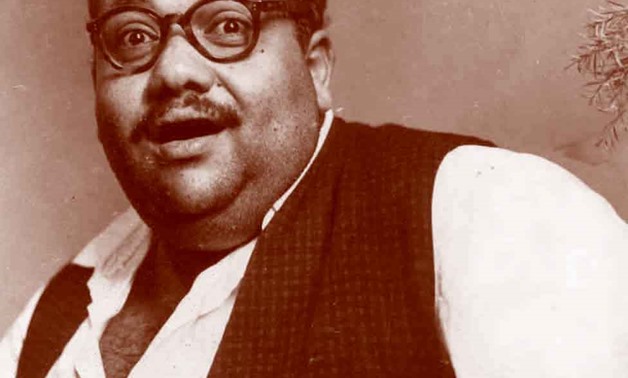
Egyptian poet Salah Jahin - Photo courtesy of wikimedia
CAIRO – 20 January 2018: Unlike narrative animation films and cartoons on screens today , Samia, Jahin’s daughter and Egyptian artist believes vibrant oral storytelling is a mortal technique that invites children into a magical world where they can find an exceptional imaginary path that drives them to visual musical production, according to Samia’s official interview published on the project’s page.
“Di el-Hekaya” is a bundle of fairy tales and folk stories national and international, performed colloquially by Samia on CD. The CD is found in Diwan bookstores where she celebrated its release on December 8, 2017.
Samia’s passion was triggered by the fact that today’s younger generation is not aware of these stories, therefore she was exceptionally determined to search and recollect these stories that inspired her in childhood.
The name of Samia’s project “Di el-Hekaya” is inspired by a poem called “The Wolf and The Lamb”, which was composed by her father, the renowned poet Salah Jahin. The opening line is: “Once upon a time, this was the story…”
Jahin is an Egyptian poet and cartoonist whose sensitivity has been framed in his colloquial poems and paintings in which he sought to liberate many of his human, societal, humorous, and political thoughts.
Samia inherited an obsession for the art of storytelling from Jahin. In his childhood, Jahin discovered his talent in storytelling and he used to passionately tell all the stories he liked to his siblings in his own fascinating way.
The late prominent Egyptian singer Abd al-Halim Hafez once described Jahin, who composed many patriotic songs for Abd al-Hali, as “A big child” for he (Jahin) used to spontaneously react to his surroundings.
Jahin went through a tough phase right after the Six-Day War in 1967. He suffered from depression and run away from his friends and family. Jahin’s disappearance triggered Abdel Halim to publish an announcement in local newspapers reading “Come back Jahin, your family is searching for you!”
His rapid change in moods and unpredictable behavior was often attributed to the difficulties his mother encountered while giving birth to him. Jahin used to suddenly get depressed but cheer up just as quick.
Jahin’s artistic journey was inspired by his love for children. His heart was always attached to an “inner child” which is a main a character in several poems.
Jahin succeeded to deliver many philosophical existentialist ideas through a dialogue with a child; for instance he would portray a conversation held between a newborn and his/her mother:
I saw a newborn babe on his mother's arm,
he cried, she soothed and tried to calm.
He wailed, she said," Son, do utter some words
He who speaks not, will come to harm...
His constant enthusiasm about the importance of a child’s healthy development was presented in numerous songs and performances. He tackled many serious issues in an innocent uncomplicated way. One of the best examples is his song “El Banat” (Girls).
“Girls” was performed by the late Egyptian singer and actress Soad Hosny and managed to brilliantly deliver a resilient message concerning gender equality. .
In celebrating Mother’s Day, “Ya mama” (Mom) was another song performed by Hosny and composed by Jahin, showing appreciation for mothers’ efforts and urging children to respect their mothers.
Jahin also delivered artwork that addressed the issue child oppression. One of those artworks include “El Dars enataha” (The Lesson is Over), a poem which acted as a depiction for the mass killings at “Bahr el Bakar” school. Jahin’s poem intensely documents the heart breaking scenes of the damages that occurred during the Israeli attacks on the school.
Jahin also focused on spreading joy among children with songs such as “Ana Ebrik el-shay” (I am the Tea Kettle). Although this song has no certain moral theme like Jahin’s other children songs, it became one of the most popular Arab songs, still loved by children and adults to this day.
Samia Jahin and Salah Jahin are not only unified by the father-daughter relationship but also by their love for the art of storytelling.

Comments
Leave a Comment